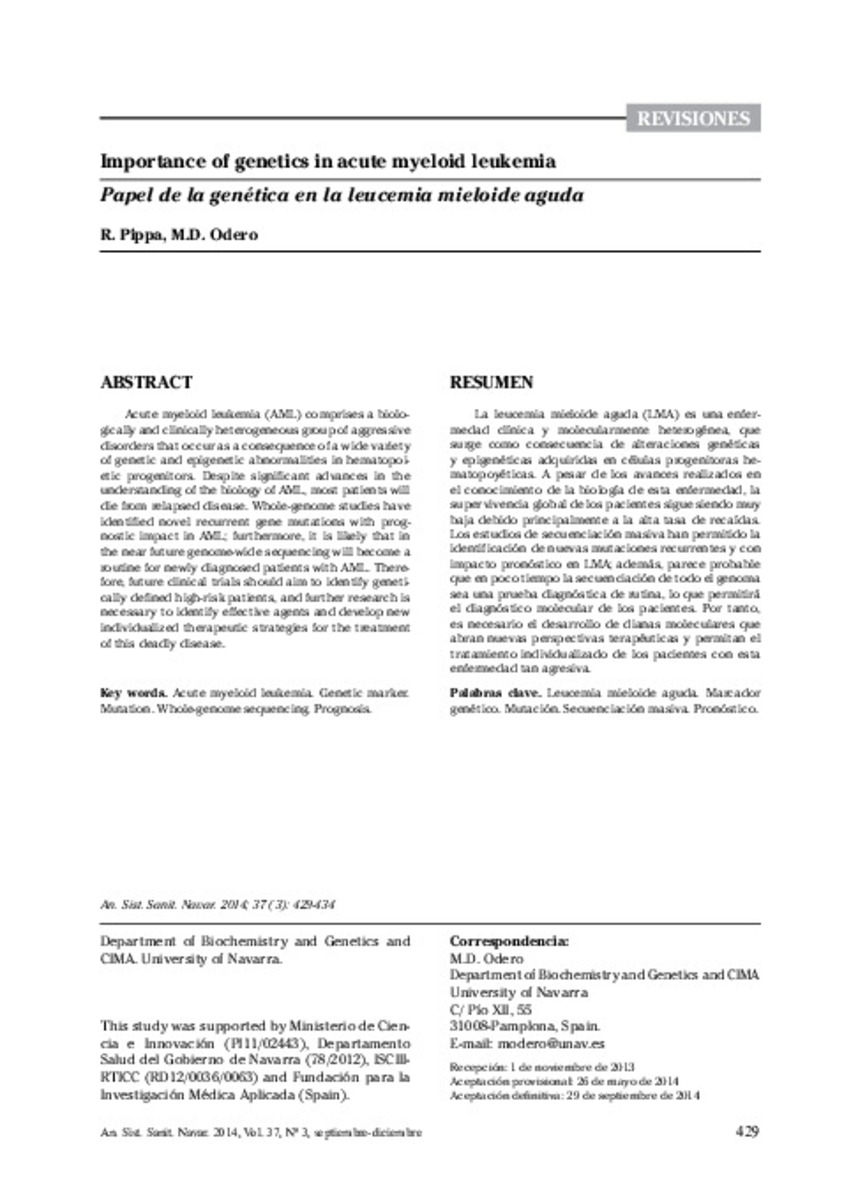Full metadata record
| DC Field | Value | Language |
|---|---|---|
| dc.creator | Pippa, R. (Raffaella) | - |
| dc.creator | Odero, M.D. (Maria Dolores) | - |
| dc.date.accessioned | 2022-08-12T12:50:31Z | - |
| dc.date.available | 2022-08-12T12:50:31Z | - |
| dc.date.issued | 2014 | - |
| dc.identifier.citation | Pippa, R. (Raffaella); Odero, M.D. (Maria Dolores). "Importance of genetics in acute myeloid leukemia". Anales del Sistema Sanitario de Navarra. 37 (3), 2014, 429 - 434 | es_ES |
| dc.identifier.issn | 1137-6627 | - |
| dc.identifier.uri | https://hdl.handle.net/10171/63915 | - |
| dc.description.abstract | Acute myeloid leukemia (AML) comprises a biologically and clinically heterogeneous group of aggressive disorders that occur as a consequence of a wide variety of genetic and epigenetic abnormalities in hematopoietic progenitors. Despite significant advances in the understanding of the biology of AML, most patients will die from relapsed disease. Whole-genome studies have identified novel recurrent gene mutations with prognostic impact in AML; furthermore, it is likely that in the near future genome-wide sequencing will become a routine for newly diagnosed patients with AML. Therefore, future clinical trials should aim to identify genetically defined high-risk patients, and further research is necessary to identify effective agents and develop new individualized therapeutic strategies for the treatment of this deadly disease. | es_ES |
| dc.description.abstract | La leucemia mieloide aguda (LMA) es una enfermedad clínica y molecularmente heterogénea, que surge como consecuencia de alteraciones genéticas y epigenéticas adquiridas en células progenitoras hematopoyéticas. A pesar de los avances realizados en el conocimiento de la biología de esta enfermedad, la supervivencia global de los pacientes sigue siendo muy baja debido principalmente a la alta tasa de recaídas. Los estudios de secuenciación masiva han permitido la identificación de nuevas mutaciones recurrentes y con impacto pronóstico en LMA; además, parece probable que en poco tiempo la secuenciación de todo el genoma sea una prueba diagnóstica de rutina, lo que permitirá el diagnóstico molecular de los pacientes. Por tanto, es necesario el desarrollo de dianas moleculares que abran nuevas perspectivas terapéuticas y permitan el tratamiento individualizado de los pacientes con esta enfermedad tan agresiva. | es_ES |
| dc.description.sponsorship | This study was supported by Ministerio de Ciencia e Innovación (PI11/02443), Departamento Salud del Gobierno de Navarra (78/2012), ISCIIIRTICC (RD12/0036/0063) and Fundación para la Investigación Médica Aplicada (Spain). | es_ES |
| dc.language.iso | eng | es_ES |
| dc.publisher | Gobierno de Navarra | es_ES |
| dc.rights | info:eu-repo/semantics/openAccess | es_ES |
| dc.subject | Acute myeloid leukemia | es_ES |
| dc.subject | Genetic marker | es_ES |
| dc.subject | Mutation | es_ES |
| dc.subject | Whole-genome sequencing | es_ES |
| dc.subject | Prognosis | es_ES |
| dc.subject | Leucemia mieloide aguda | es_ES |
| dc.subject | Marcador genético | es_ES |
| dc.subject | Mutación | es_ES |
| dc.subject | Secuenciación masiva | es_ES |
| dc.subject | Pronóstico | es_ES |
| dc.title | Importance of genetics in acute myeloid leukemia | es_ES |
| dc.title.alternative | Papel de la genética en la leucemia mieloide aguda | es_ES |
| dc.type | info:eu-repo/semantics/article | es_ES |
| dc.description.note | Creative Commons Reconocimiento-CompartirIgual 4.0 Internacional | es_ES |
| dc.identifier.doi | 10.4321/S1137-66272014000300011 | - |
| dadun.citation.endingPage | 434 | es_ES |
| dadun.citation.number | 3 | es_ES |
| dadun.citation.publicationName | Anales del Sistema Sanitario de Navarra | es_ES |
| dadun.citation.startingPage | 429 | es_ES |
| dadun.citation.volume | 37 | es_ES |
| dc.identifier.pmid | 25567395 | - |
Files in This Item:
Statistics and impact
Items in Dadun are protected by copyright, with all rights reserved, unless otherwise indicated.






